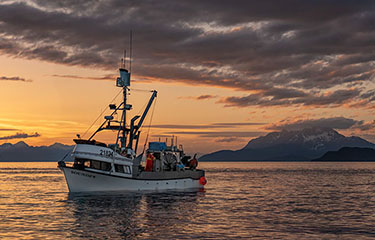The chinook salmon troll fishery in the U.S. state of Alaska is under renewed threat of potential suspension after a U.S. federal judge ruled the National Marine Fisheries Service must remake its management plan for king salmon.
The long-anticipated ruling from U.S. District Court Judge Richard Jones, issued 2 May, requires that NMFS come up with a new biological opinion that analyzes the impact of the king salmon fishery on the Southern Resident killer whale population in the U.S. state of Washington.
The endangered orca whale population is down to 73 animals. The Wild Fish Conservancy sued over NMFS’ last plan, arguing the agency’s proposed mitigation measures to boost salmon stocks are insufficient to ensure the orcas have enough food to slow their population decline.
The Southeast Alaska chinook salmon troll fishery summer salmon season opener on 1 July is now in doubt as a result of the ruling. NMFS and Alaska state fisheries officials have been preparing for the possibility since an earlier judgement in August 2022 faulted NMFS for failing to meet requirements under the Endangered Species Act. Commercial fishing industry groups said they are looking to appeal the decision.
“The court’s decision is disappointing, not only because it puts the future of Alaska’s small-boat fishing families in jeopardy, but it distracts from the larger, more-urgent issues that are causing the continued decline of the Pacific Northwest’s Chinook and orca populations,” Alaska Longline Fishermen’s Association Director Linda Behnken said. “The science and data clearly show that habitat loss, dams, climate change, water pollution, and urbanization are harming salmon and orcas in the Northwest – not our hook-and-line fishery that operates almost 1,000 miles away and has done so sustainably for over 100 years.”
The court order and a fishery closure could immediately boost the king salmon food supply for orcas, according to Wild Fish Conservancy Executive Director Emma Helverson.
“After years of inaction by our federal government to address the prey crisis facing the Southern Residents, Judge Jones’ decision will finally provide starving orcas immediate access to their primary prey,” Helverson said. “[Closing the fishery] is also helping to recover and restore wild chinook from rivers throughout Oregon, Washington, and British Columbia, essential to rebuilding both populations in the long-term.”
Alaska Trollers Association and Alaska Longline Fishermen’s Association issued a joint statement expressing its frustration at the ruling.
“The Southeast Alaska troll fishery directly employs 1,500 fishermen, with 85 percent of troll fishery permit holders living in Southeast Alaska, and is consistently one of Southeast Alaska’s top-three most valuable fisheries, providing renewable income for fishing families living in the region’s rural, isolated communities,” they said. “Prized around the world for its premium quality salmon, the troll fishery generates $148 million annually in economic outputs that include restaurant sales, consumer purchases, transportation jobs and other benefits accruing throughout the West Coast of the U.S. and beyond.”
Both associations said they are working with NMFS and Alaska state officials about potential next steps, and planning with their lawyers to appeal the court ruling.
The Wild Fish Conservancy contends fewer king salmon have been a key factor in the decline of the Southern Resident orca population from almost 100 animals 25 years ago. Closing the summer and winter Southeast Alaska troll seasons would leave about 172,000 king salmon in the water, the group said.
“Research has shown an alarming 69 percent of Southern Resident killer whale pregnancies are aborted due to insufficient chinook salmon, inbreeding, [and] depression [have] been identified as a growing threat to the population’s survival and recovery,” the group said. “[Closing the troll fishery] would increase prey availability by approximately 6 percent, which would be enough to stabilize the population and stop their decline toward extinction, though additional actions would be required to begin to grow the population.”
U.S. senators Lisa Murkowski and Dan Sullivan, Republicans representing Alaska, and U.S. Rep. Mary Sattler Peltola (D-Alaska), issued a joint statement condemning the ruling. The Alaska congressional delegation filed an amicus brief on 6 March supporting Southeast Alaska troll fishermen.
“This is a disastrous decision for Southeast Alaska that will only serve to harm those small boat troll fishermen who are trying to provide for their families. This lawsuit should have been dismissed months ago, but now threatens devastating restrictions that will harm hundreds of Alaskans and dozens of coastal communities – all while doing nothing to actually benefit the Puget Sound orca population,” Murkowski said. “Common sense and sound science must guide efforts to protect species. This uniquely awful decision blames Alaska for Washington’s problems, and suggests that an end to sustainable fishing in Southeast Alaska can cure decades of destructive environmental practices in Washington. If you want my ‘biological opinion,’ this is beyond ridiculous and cannot stand. The delegation will stand together, along with the State of Alaska, to fight this ruling.”
Peltola, first elected in 2022 on a fisheries-focused platform, also railed against the ruling.
"If this order is allowed to stand, Southeast Alaska will suffer a devastating loss, putting thousands of jobs at risk in communities that depend on this sustainably-managed fishery,” Peltola said. “I will be joining the state of Alaska, NOAA, Alaskan fishermen, and other conservation groups who agree that this lawsuit is frivolous and incapable of protecting a whale population that faces much greater threats such as pollution and habitat loss in its home region near Seattle. I strongly support the governor's movement to appeal this ruling and save the summer fishing season, and I encourage NOAA to complete an update to the biological opinion at the center of this case."
Reporting by Kirk Moore
Photo courtesy of NOAA/Joe McCabe







